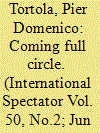| Srl | Item |
| 1 |
ID:
139619


|
|
|
|
|
| Summary/Abstract |
Europe’s woes mark a new chapter in the longstanding theory/history nexus in European studies. The euro crisis has brought integration theory back onto the scholarly agenda and highlighted the value of neo-functionalism – and more precisely its key ‘spillover’ mechanism – as a framework for interpreting current politico-institutional dynamics in the European Union. We are, however, at a particular point of the neo-functionalist narration, in which the transition from low to high political integration has opened a phase of political fluidity that makes ideas and political leadership crucial in determining the future course of integration. In this phase, the positive scheme of neo-functionalism and the normative one of federalism come together, bringing the intellectual trajectory begun after WWII to full circle. Whether this new encounter will result in further integration depends primarily on the content of new federalist ideas, the emergence of an effective European leadership, and the presence of a favourable international environment. For all three factors, the record so far has been mixed at best.
|
|
|
|
|
|
|
|
|
|
|
|
|
|
|
|
| 2 |
ID:
183846


|
|
|
|
|
| Summary/Abstract |
Transnational networks of sub-national authorities are an established and growing phenomenon in Europe, where they perform a number of (soft) governance functions for their members, often in direct connection with European Union (EU) institutions. Differentiation is an inherent characteristic of sub-national authority networks, which is nonetheless still largely unexplored. Building on original empirical data, we identify three dimensions of differentiation generated by networks – ‘insider-outsider’, ‘compound’ and ‘multi-level’ differentiation – and discuss their implications for the efficiency, effectiveness and legitimacy of these organisations. Based on our analysis, we also sketch some avenues for future research connecting the national and sub-national dimensions of differentiation in Europe.
|
|
|
|
|
|
|
|
|
|
|
|
|
|
|
|